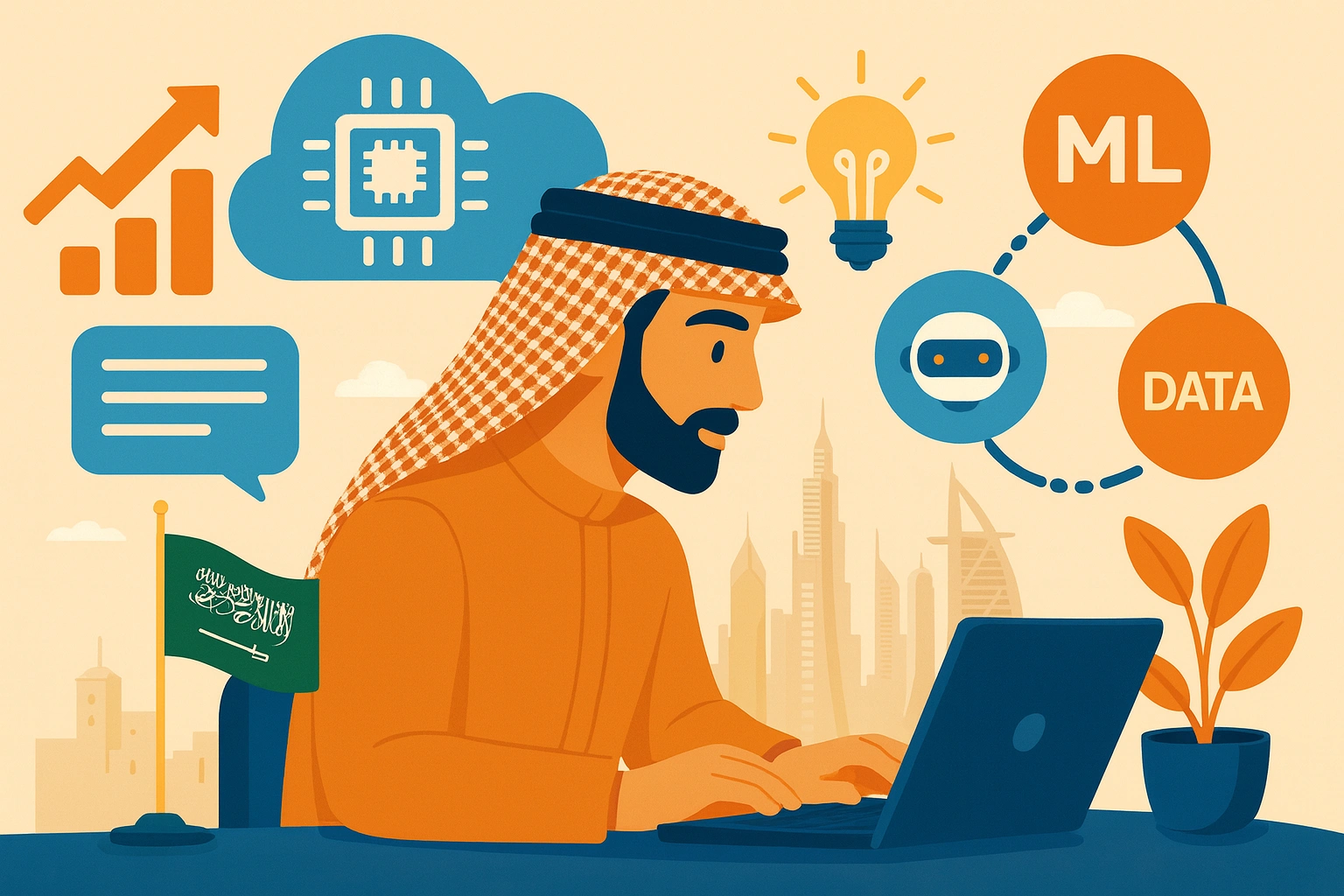As 2025 approaches, AI and biotech jobs are on the rise especially in the UAE and high-growth sectors like quantum computing and gene editing. These high-paying jobs in demand globally promise innovation and stability. Industries from tech to healthcare are racing to adopt AI and gene-engineering breakthroughs. In this guide, we’ll explain why AI and biotech careers are booming, which roles are leading the growth (with real search data), the skills you need, where to find these jobs worldwide, and how you land one.

Why AI and Biotech Jobs Are Exploding in 2025
AI and biotech are booming. Since GPT, companies have rushed to adopt AI, while biotech fields like gene editing are surging with synthetic biology set to hit $190B by 2034. (Source: BioSpace), and the global CRISPR market is expected to reach nearly $15 billion by 2032, driving serious job demand across both sectors.
- AI skills command premium pay: Workers with AI expertise now earn 56% more than peers, according to PwC's 2025 Global AI Jobs Barometer. Companies in information tech and professional services report surging demand for AI skills. In the UAE, AI-related job postings in the tech sectors have seen significant growth, reflecting the nation's strategic focus on AI (Source: Digital Dubai State of AI Report).
- Revenue and hiring growth: Sectors most exposed to AI saw revenue growth 3–4× higher since 2022. Industries adopting AI saw wages rise twice as fast as in other industries. In the UAE, jobs heavily exposed to AI grew 13% from 2021–2024, versus 2% for low-AI roles.
- Biotech innovation boom: Gene therapy, CRISPR, and synthetic biology are creating new biotech jobs fast. With markets expected to double or more by 2028, hiring is ramping up across research, healthcare, and agriculture.
- Data-driven research: Biotech is now data-driven. Roles like bioinformatics scientist blend biology and data science, with rising demand for experts in genomic and clinical analysis.
- Global trends: The UAE is rising as an AI hub, while cities like Boston and London keep drawing biotech investment. U.S. life sciences jobs hit 2.1 million in 2025, showing strong long-term demand.
In summary, both AI and biotech fields are creating high-growth jobs due to massive R&D funding, technology adoption, and global initiatives. The next section highlights specific roles at the forefront of this boom.

How People Are Landing 6-Figure AI & Biotech Jobs
The best-paying AI and biotech jobs aren’t going to people with the longest resumes. They’re going to those who saw the trends early, learned fast, and applied before the roles got crowded.
Right now, these five roles are in high demand with surprisingly low competition:
Quantum Algorithm Developer
Still under the radar, this field needs niche physics or CS skills and few are qualified, making it a rare opportunity.
Synthetic Biologist
One of the most versatile roles in biotech used in pharma, food, and sustainability. If you know biology and systems thinking, companies need you. Its interdisciplinary nature, blending biology with engineering and design, means fewer professionals possess the full skill set.
AI Safety Researcher
A growing niche focused on making AI safe and reliable. Perfect for those with ML skills and an interest in ethics or risk analysis. An urgent, emerging niche, demand outstrips supply due to the critical need for ethical AI development and a scarcity of experts with both ML and safety expertise
Bioinformatics Scientist
Biology meets data science. If you know Python or R and understand genomics, there’s strong demand in healthcare, pharma, and research. The need for strong computational skills combined with deep biological understanding narrows the talent pool
CRISPR Scientist
Gene editing is no longer the future it’s now. If you’ve worked with molecular biology tools or CRISPR systems, you’re already in demand. Requires specific hands-on molecular biology and gene-editing expertise, which is not widely available
What these roles have in common:
- They’re hiring globally and often remotely
- They offer six-figure salaries
- They’re still low competition
- You don’t need 10+ years of experience just targeted skills
Most jobseekers still haven’t caught on. That’s your advantage. Move now, and you’re ahead of the curve.

What Skills Are Required to Get Hired in These Roles?
Landing a role in AI or biotech requires a mix of deep technical skills and domain knowledge. Below are key skills for each of the top roles above. Dr. Job’s AI Resume Builder can help you highlight these competencies in your CV.
Across these roles, employers look for problem-solving ability, strong communication (to collaborate on cross-disciplinary teams), and continuous learning attitude. Soft skills like teamwork and project management (e.g. organizing experiments, agile development) also matter. Dr. Job’s Job-Ready Score tool can help you identify any skill gaps: it benchmarks your profile against target roles to show what to learn or emphasize.

Where Can You Find These Jobs Internationally?
High-growth AI and biotech roles aren’t limited to one region. In fact, many tech hubs and emerging markets are actively recruiting:
UAE and Gulf: The UAE is leading the region in AI and biotech growth. Dubai alone has over 800 AI firms. With tax-free salaries, Golden Visas, and nonstop hiring from research hubs like Hub71, it’s a serious opportunity for both expats and locals.
US and Canada: Silicon Valley, Boston, and Toronto remain top spots for AI and biotech. Remote roles are common in data-heavy jobs. Lab work is still mostly based in major cities, but funding and hiring remain strong.
Europe: The UK, Germany, Switzerland, and Nordic countries host some of the best biotech and AI centers. Despite post-Brexit shifts, EU-funded research is expanding. Skilled candidates are in demand from London to Berlin.
Asia Pacific: China, India, Japan, South Korea, and Singapore are all scaling their AI and biotech sectors fast. Roles here often include hybrid or remote options, especially in software and research.
Remote and Global: AI, machine learning, and bioinformatics jobs are increasingly remote-friendly. Many computational roles are now listed on job boards with flexible location filters. These are legitimate openings with real companies.
Focus on companies that are building future tech. Look for AI labs, biotech startups, national research programs, and forward-thinking employers. That’s where the demand is growing fastest.

Salary Insights by Role and Country
Compensation varies widely by role, experience, and location. Below are rough ranges to give a sense of what to expect (figures are base salary estimates):
- Quantum Algorithm Developer:
- US: Typically pay $106,000 – $164,000 per year.
- Europe: Roughly €70,000–€120,000, depending on the city.
- UAE: Top AI/quantum engineers often earn AED 200k+ (tax-free).
- Synthetic Biologist:
- US: Average about $91,000 per year.
- Europe: Similar roles might pay €60,000–€80,000.
- Middle East: Salaries are less transparent but often competitive, especially for senior biotech researchers.
- Bioinformatics Scientist:
- US: Average is around $76,000. Top biotech areas (San Francisco, Boston) can offer higher pay (up to $100k+ for experienced scientists).
- Europe/UK: Expect €50k–€70k.
- Remote: Often match these ranges but may come with flexibility.
- AI Safety Researcher:
- San Francisco Bay Area (US): Median software engineers earn $222,000, and AI safety roles can exceed $200,000+ (including bonuses).
- Europe: Software research roles may be €80,000–€150,000.
- UAE: AI skills command an average base of about AED 300,000/yr ($82,000) (often with housing allowances).
- CRISPR Scientist:
- US: Typically pay in the range $60,000–$100,000+ per year, depending on education (MSc vs. PhD) and seniority.
- Europe: Salaries might be €50,000–€90,000.
- UAE and other regions: Still developing large-scale gene therapy programs, so local salaries may be on par with standard biotech research pay.
These figures are general guides. Benefits (healthcare, stock options, housing, etc.) also vary. For example, UAE tech jobs often include housing and education allowances. When negotiating, highlight your specialized skills (which often justify a premium).Use our free AI salary checker to view the most accurate and up-to-date salary ranges based on your field, experience, and other factors.
FAQs
- Q: What degree do I need for AI safety roles?
- A: Most AI safety roles require strong STEM credentials. A bachelor’s in computer science, AI, or math is the baseline, but many researchers hold or pursue a PhD in machine learning or cognitive science. For technical or engineering roles, a bachelor’s or master’s with solid ML skills may be enough.
- Q: Can I work remotely as a bioinformatics scientist?
- A: Yes and no. Bioinformatics is more remote-friendly than wet-lab biotech because much of the work is computational. Early-career bioinformaticians often work from home or in hybrid setups, analyzing genomic data for biotech or healthcare companies. However, note that the pandemic-driven boom in remote biotech roles has cooled off. Many employers still value on-site collaboration for lab-focused projects. In short, purely data-centric bioinformatics jobs can be remote, but roles involving hands-on lab work or coordination with clinical teams may require being on-site or hybrid. Always check the job listing for “remote” or “flexible location.”
- Q: Are biotech jobs in demand globally?
- A: Demand varies by subfield. The broad biotech sector has faced a recent slowdown (funding tightened and some hiring paused).1 Despite this, the overall life sciences workforce remains large. U.S. life-sciences employment hit a record 2.1 million in early 2025, supported by government and private investment.2 High-tech niches in biotech, however, are growing robustly. For instance, CRISPR gene-editing and AI-driven drug discovery are expanding rapidly. Global aging populations and healthcare innovation mean long-term growth in areas like personalized medicine, genomics, and bioinformatics. In sum, while general biotech jobs are competitive, specialized roles (genetic engineering, bio-data science) are very much in demand worldwide.
Ascend
AI and biotech are transforming the job market, with roles like quantum developer, synthetic biologist, and CRISPR scientist in high demand. The data is clear these careers are growing fast. If you’ve got the skills or are willing to learn, now’s the time to move. Start applying and position yourself for a future-proof career.








 2025-11-28
2025-11-28
 2025-11-24
2025-11-24
 2025-11-18
2025-11-18
 2025-11-11
2025-11-11
 2025-11-10
2025-11-10